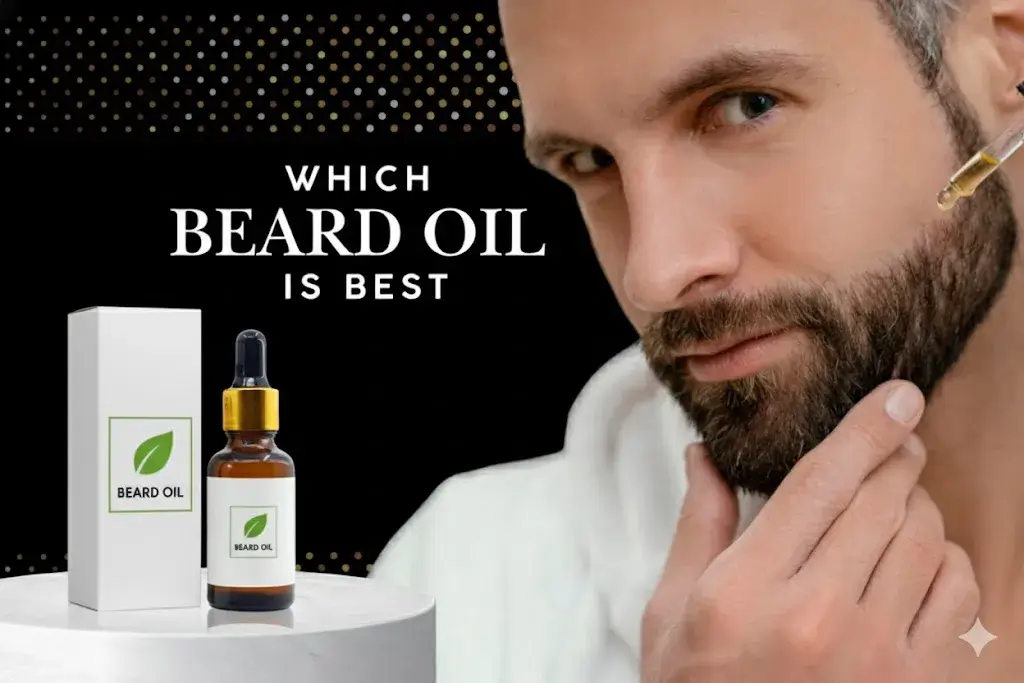Are you looking to Get Rid of Oily Scalp Naturally at Home? If yes then this will be your answer. Waking up to greasy hair or noticing your scalp looking shiny just hours after washing it can be frustrating. An oily scalp is a common issue that many people face, but the good news is that you can manage it naturally from the comfort of your home.
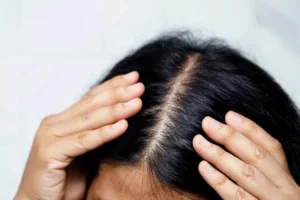
In this article, we’ll explore what causes an oily scalp, its signs, and effective, easy-to-follow home remedies to keep your scalp fresh and healthy. Let’s dive in and make greasy hair a thing of the past!
What Is an Oily Scalp?
Your scalp naturally produces oil, called sebum, to keep your hair and skin moisturized. However, when your scalp produces too much sebum, it can make your hair look greasy and flat.
An oily scalp can also lead to other issues like dandruff, itchiness, or even hair thinning if not addressed properly. The goal is to balance the oil production, not strip it away completely, as some oil is essential for healthy hair.
Why Does Your Scalp Get Oily?
Several factors can cause excess oil, but identifying the root can help you get rid of oily scalp naturally and effectively. Here are some common reasons:
- Overactive Sebaceous Glands: These glands produce sebum, and some people naturally have more active glands due to genetics or hormonal changes.
- Hormonal Imbalances: Puberty, pregnancy, or stress can increase oil production.
- Poor Haircare Habits: Overwashing or using harsh products can irritate your scalp, causing it to produce more oil to compensate.
- Diet: Eating too many greasy or sugary foods may trigger excess oil production.
- Environmental Factors: Humid weather or pollution can make your scalp oilier.
- Frequent Touching: Touching your hair or scalp often transfers oil from your hands, making it worse.
Signs You Have an Oily Scalp
Not sure if your scalp is oily? Here are some telltale signs:
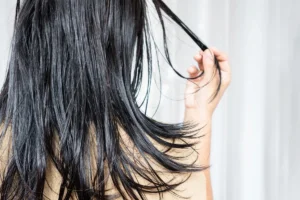
- Your hair looks greasy within a few hours of washing.
- Your scalp feels itchy or sticky.
- You notice a greasy patch on your pillow in the morning.
- Your hair appears flat or lacks volume.
- You may have oily dandruff, which sticks to your scalp and hair.
If these sound familiar, don’t worry! Let’s explore natural ways to tackle an oily scalp at home.
10 Natural Ways to Get Rid of Oily Scalp
Here are 10 simple, natural remedies and habits to help you control excess oil and keep your scalp healthy. Most of these use ingredients you probably already have at home!
1. Wash Your Hair Regularly (But Don’t Overdo It)
Washing your hair regularly removes excess oil, dirt, and buildup. Use a gentle, sulfate-free shampoo designed for oily scalps, and wash every 2-3 days. Overwashing can strip your scalp of natural oils, making it produce even more sebum. Aim for a balance—clean but not squeaky clean!
Tip: Rinse with lukewarm water, as hot water can stimulate oil production.
2. Try Apple Cider Vinegar Rinse
Apple cider vinegar (ACV) is a fantastic natural remedy for oily scalps. It balances your scalp’s pH, reduces oiliness, and removes product buildup.
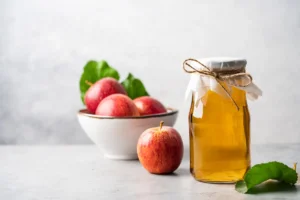
How to Use to Get Rid of Oily Scalp
- Mix 2-3 tablespoons of ACV with 1 cup of water.
- After shampooing, pour the mixture over your scalp and hair.
- Let it sit for 2-3 minutes, then rinse thoroughly.
- Use this 1-2 times a week for best results.
3. Use Aloe Vera for a Soothing Cleanse
Aloe vera is known for its soothing and cleansing properties. It can reduce oiliness, calm an itchy scalp, and even help with dandruff.
How to Use:
- Scoop out fresh aloe vera gel from a leaf or use store-bought pure aloe gel.
- Apply it to your scalp and massage gently for 5 minutes.
- Leave it on for 10-15 minutes, then rinse with lukewarm water.
- Repeat 1-2 times a week.
4. Lemon Juice to Cut Through Grease
Lemon juice is a natural astringent that can reduce oil and fight dandruff. Its citric acid helps balance your scalp’s oil production.
How to Use:
- Mix the juice of one lemon with 1 cup of water.
- Apply it to your scalp after shampooing, massaging gently.
- Leave it on for 5 minutes, then rinse thoroughly.
- Use once a week, as overuse can dry out your hair.
Note: Avoid this if you have a sensitive scalp, as lemon can be irritating.
5. Tea Tree Oil for a Deep Clean
Tea tree oil has antibacterial and antifungal properties, making it great for oily scalps and dandruff. It cleanses without stripping natural oils.
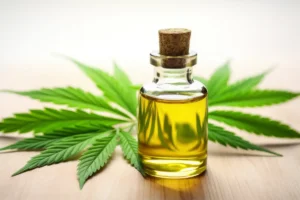
How to Use to Get Rid of Oily Scalp with Tea Tree Oil
- Add 3-5 drops of tea tree oil to your regular shampoo or dilute it with a carrier oil like coconut oil.
- Massage into your scalp and rinse thoroughly.
- Use 1-2 times a week.
6. Use a Clarifying Shampoo Sparingly
A clarifying shampoo can remove excess oil and buildup, but it’s strong, so use it only once a week. Look for shampoos with ingredients like tea tree oil, charcoal, or salicylic acid, which target oiliness without being too harsh.
7. Try a Green Tea Rinse
Green tea is packed with antioxidants that can reduce oil production and soothe your scalp. It’s also great for promoting hair health.
How to Use:
- Brew a cup of green tea and let it cool.
- Pour it over your scalp after shampooing, massaging gently.
- Leave it on for 5-10 minutes, then rinse.
- Use 1-2 times a week.
8. Scalp Massage with Jojoba Oil
It might sound counterintuitive to use oil on an oily scalp, but jojoba oil mimics your scalp’s natural sebum, helping regulate oil production. A gentle scalp massage also improves blood circulation, promoting a healthier scalp.
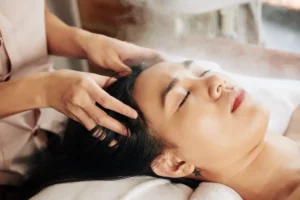
How to Use:
- Apply a few drops of jojoba oil to your scalp.
- Massage gently for 5-10 minutes.
- Wash it out with a mild shampoo.
- Do this once a week.
9. Fuller’s Earth (Multani Mitti) Mask
Fuller’s earth is a natural clay that absorbs excess oil and cleanses the scalp. It’s a popular remedy in many households for tackling greasy hair.
How to Use to Get Rid of Oily Scalp
- Mix 2-3 tablespoons of Fuller’s earth with water to form a paste.
- Apply it to your scalp and let it sit for 15-20 minutes.
- Rinse thoroughly with lukewarm water.
- Use once a week.
10. Adjust Your Diet
What you eat can affect your scalp’s oil production. Reduce greasy, fried, or sugary foods, and focus on a balanced diet rich in fruits, vegetables, lean proteins, and healthy fats. Foods high in omega-3 fatty acids, like salmon or walnuts, can help regulate oil production.
Note: Stay hydrated by drinking plenty of water to keep your scalp and hair healthy.
Things to Keep in Mind for a Healthy Scalp
To maintain your results and prevent an oily scalp from coming back, follow these tips:
- Avoid Touching Your Hair: Your hands carry oils and dirt that can make your scalp greasier.
- Protect Your Scalp from the Sun: Too much sun exposure can stimulate oil production. Wear a hat or scarf when outdoors for long periods.
- Limit Heat Styling: Blow dryers, straighteners, and curling irons can irritate your scalp, leading to more oil. Use them sparingly and on low heat.
- Choose the Right Products: Avoid heavy conditioners or styling products near your scalp, as they can add to the oiliness.
- Stay Consistent: Natural remedies take time to show results, so stick to a routine for at least a few weeks.
How to Make Your Hair Not Look Greasy in 5 Minutes
Need a quick solution for greasy hair before heading out? Try this:
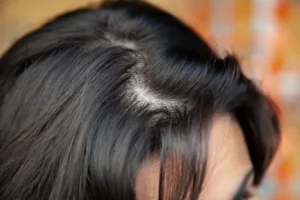
- Dry Shampoo: Sprinkle a small amount of dry shampoo or baby powder onto your roots, massage it in, and brush it out. It absorbs oil instantly.
- Blotting Papers: Gently press oil-absorbing blotting papers on your scalp to soak up excess oil.
- Hairstyle Trick: Pull your hair into a sleek ponytail or bun to hide greasiness.
When to Seek Professional Help
If home remedies don’t work to get rid of oily scalp or you notice excessive hair thinning, persistent dandruff, or scalp irritation, it might be time to see a dermatologist. They can recommend clinical treatments like medicated shampoos, laser therapy, or other solutions tailored to your needs.
Takeaway
An oily scalp can be annoying, but with the right natural remedies and habits, you can keep it under control. From apple cider vinegar rinses to a balanced diet, these simple, at-home solutions can help you achieve a healthier scalp and fresher-looking hair.
Be patient, stay consistent, and avoid harsh products that could make things worse. Here’s to saying goodbye to greasy hair and hello to confidence!
You May Also Like
FAQs About Oily Scalp
Q: Can an oily scalp cause hair loss?
A: Excess oil can clog hair follicles, potentially leading to hair thinning over time. Keeping your scalp clean and balanced can help prevent this.
Q: How often should I wash my oily scalp?
A: Every 2-3 days is ideal. Overwashing can make your scalp produce more oil.
Q: Are there shampoos specifically for oily scalps?
A: Yes, look for shampoos with ingredients like tea tree oil, charcoal, or salicylic acid, which target oiliness and buildup.
Q: Can dandruff be caused by an oily scalp?
A: Yes, oily scalps can lead to oily dandruff, which sticks to the scalp. Remedies like tea tree oil or lemon juice can help.
With these tips and remedies, you’re well on your way to a healthier, less oily scalp. Try them out and let your hair shine—without the grease!

